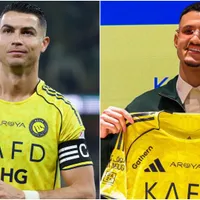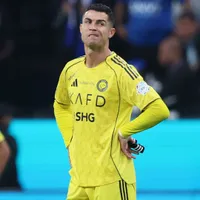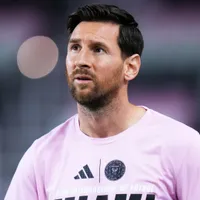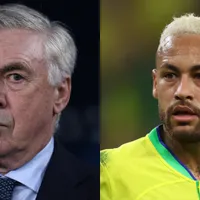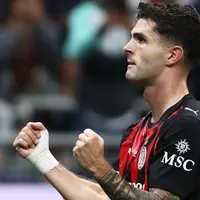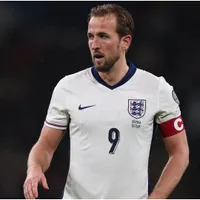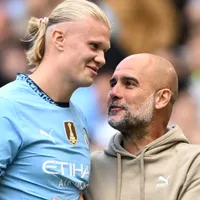John Terry, the steel of the England defense, faces a tough challenge this weekend when the Three Lions travel to Cardiff to face Wales in a crucial Euro 2012 qualifying match. With a sold-out crowd of 69,000 expected at Millennium Stadium, Terry and his England teammates will definitely face a battle both on and off the pitch. But as captain for Chelsea and a veteran on the international stage, John Terry is used to walking into these types of cauldrons and staying focused on his game.
Terry took time out of his busy schedule recently to speak with EPL Talk’s Richard Farley for an exclusive one-on-one conversation.
We start our discussion with John, who was kind enough to spend about 20 minutes with us, by talking about the difficulties, the challenges, of switching between the club mindset, where you have all these different competitions going on, to the national-team mindset, where you have a new set of teammates, often an entirely different setup you’re playing in, and different goals.
Over the years, John has had the benefit of sharing that responsibility with a number of different Chelsea teammates, most consistently Frank Lampard and Ashley Cole. We specifically focus in on Ashley Cole and the relationship that John, as a left center-half for both club and country, has with his left fullback, talking to him about what he and Ashley have contributed to each other’s successes and how his role, as a left?center half, changes depending on what Ashley Cole does. We also talk to him about one of his latest teammates, David Luiz, coming in, forming a new partnership with him at the center of defense for Chelsea. And we talk about the difficulties of not, over the last year or so, having a consistent presence to his right for the national team.
Here is the exclusive interview between Richard Farley of EPL Talk and John Terry, who has now been appointed captain for England’s upcoming game against Wales:
Richard: England play Wales this weekend. The first time the nations have met since qualifying for the World Cup in 2006. How does playing one of the home nations differ from a normal match?
John: ‘The fans around the game will be very intense anyway. So the atmosphere’s going to be incredible at the Millennium Stadium. You know they’ve not had the best start to the group, but one thing’s for sure, they’re going to be up for the game. The fans are going to be pumped up, and we need to expect them to come out and give us a right good go the first 20 or 30 minutes in the game. So once again, it’s important that we stay compact, we stay organized and after that, you know, our fitness and our quality can really show through.’
Richard: John, there was reporting in February that the FA was in talks to rekindle the old British home championship. Is that something you think players would support?
John: ‘I certainly would. I can’t speak for everybody else, but I would. I mean, when I was growing up, when I was really young that was part and parcel of it. The fans thoroughly enjoyed it from both ends. I personally think it would be a good thing. You know, I don’t know what the issues in the FA will take on that, but as long as it’s done in the right way and in the right spirit, I think it would be great.’
Richard: Do you have a particular memory of those competitions from watching those matches when you were younger?
John: ‘No, there just too many really. I just remember seeing them with my dad and my family watching England-Scotland games, and England, Wales, Ireland and things like that. It’s just a memory that will sort of live with me. And me dad telling me about the passion in the fans and stuff like that, so I’d love to see it in my generation.’
Richard: Well, do you think maybe that’s a memory that the current generation – the people, the kids that are coming up now – are missing out on by not having the home championship around?
John: ‘Oh, yes, I think you could. I think that’s why the FA are now looking into that as being the solution. It’s important because, as I said before, the fans will show great passion and we’re very proud to be English and the Welsh fans will say the same as well. It’s just a chance for us to come together and show what quality we have on the pitch as well, because you know Wales have got some very good young players coming through at the moment. And they can test their self against us being England with some of our best players as well, so, without it being too far, it could be an ideal situation for friendlies on the eve of tournaments and stuff like that.’
Richard: Well, John, we are on the eve of your 2012 qualifying starting up again, and England has got off to a decent start — two wins and a draw to this point — but thanks to the October draw to Montenegro, the team is in second place in their group, albeit with a match in hand. Are you satisfied with how the guys have started the qualifying campaign?
John: ‘Yeah, I am, actually, we obviously knew the Montenegro game was going to be tough. I’ve spoken to Ivanovic at Chelsea. He’s Serbian, and said they are very well organized side, very strong, very solid. And so we half expected that at Wembley for them to be that. It’s unfortunate we couldn’t break them down, because obviously we would be in an even better position at the moment.
But we’ve had a good start. We’ve not been beaten yet. We’re away to Wales – we’re hoping obviously to win the game, but I think the game in the end against Montenegro could be crucial though, so it’s important between that time we do win our games, the likes of Wales and the other games coming up.’
Richard: John, do you think the team has made progress since the World Cup, or do you even think there is a need to progress? One side of this discussion could note that the team may have just had one disappointing tournament and has otherwise been strong. And the other side could focus on that World Cup.
John: ‘Last year on the build up to the World Cup and in the group stages we looked very good. Probably some of the best football I seen us play in the last four to five years, actually. So there’s always the encouraging thing to take away from things and disappointing things where you can always look to improve upon.
And with the manager we’ve got, and the players we’ve got, we’re always eager to improve. We’ll certainly look to do that and have done in the initial space and time that we’ve been back together, for the group games and friendlies and stuff like that. So we’ll continue to work on them and hopefully improve and put ourselves on a good run throughout this campaign again, making sure we get to the tournament.’
Richard: Part of the reason there was such a debate coming out of South Africa was the high expectations the Three Lions constantly have to deal with. Do you think those expectations are fair, and what kind of impact do they or the disappointment that comes with them, have on you and the team?
John: ‘Obviously the expectations are there, and unfortunately they always have been since I’ve come into the England side, but once again, we have expectations for our club, England, and that’s part and parcel of the game, and if you want to play at the very top, you’re going to have to learn to deal with that.
So as a group of players we accept that — we accept that the fans are obviously frustrated when we get knocked out of a tournament, but it’s very key for them to stay with us, because as you said, we’ve got a good start and some promising things have come since the World Cup. And hopefully with that kind of performance, you know we can get the fans back onside and go on a good run and get everyone believing again.’
Richard: But the international game is much more competitive than it was just a few years ago. There isn’t that much room for the best teams to get better, but there’s always room for these new nations that are just coming into their football maturity to catch up. Do you ever get frustrated when you see a media punditry denigrating England’s performances, even though they are dealing with an international landscape that is much different than the landscape they came to know when they were coming into their own footballing careers.
John: ‘It’s refreshing to hear you say that as well. You could obviously use the improvements of the smaller sides, because five, ten years ago, things were a lot different then, but the players have obviously improved, tactically they’ve improved. They’re much more organized. The managers are more experienced and that’s only going to get better.
And we can see in the international level — in the leagues across the world — the gap’s closing between the top sides and the bottom sides, and everybody being able to beat each other, or get a good draw or a good point against a very good team. So the improvement’s obviously there, and we have to respect that as a group of players. And sometimes you walk away from a game, and taking a draw is a good result. And obviously, you know, coming to the end, judge us on that and judge us when we get into these tournaments and when we qualify.’
Richard: Yeah, that Montenegro result really does seem to embody this, and that 0-0 result might look like a pretty good point at the end of this cycle. And John, these qualifying cycles — they tend to be as much of a process as they are a competition. The team has to be preparing itself for Euro 2012 in addition to qualifying for it. Where would you like to see the squad improve over the next year to best position itself for the tournament?
John: ‘I think first and foremost it’s important to win the game, with the manager as well. He’s certainly one of those managers who tactically is always looking to improve formations, bringing different set plays to the team, to the faults of the players as well. Many different things. When we attack, we attack in numbers.
And things like this we’ve looked upon, and as I said, it’s difficult because at times we do meet up with England, and we’ve only got 10 days to prepare for a game, and unfortunately, you know, we don’t get months at a time where we have to sort things out. But in the short space of time, the manager does get across whatever he wants us to improve. And obviously by the time the next tournament comes, with a disappointment and the learning experience and the last World Cup we can take that into the Euros and hopefully improve upon where we got to last time.’
Richard: John, you’ve been in the England team since 2003. You just turned 30 a few months ago. If things go well, you could have a couple more Euros, one or two more World Cups ahead of you, but how long do you envision yourself continuing to play for England?
John: ‘I love playing for my country first and foremost, and it’s important we go back to that fitness one again. If I’m fit and playing at the very top, and being selected, then that’s great for me. I want to continue, you know, as far as I can.
And then we’ve seen the likes of David Beckham, which obviously gives kids encouragement, to the younger players behind him, and myself to keep going until the end of your career. And it’s important now, though, that you look after your body — you know, what you eat, your preparation before and after games, and things like this. It’s not just on the field nowadays as well that can help with that process. But as far as playing for my country, I love it. I’m very proud to be English. I want to continue right to the very end.’
Richard: And John, you’ve been in the England set-up for eight years now. Is there a memory that stands out to you? A moment that you’re most proud to be a part of?
John: ‘Yeah, I think my first cap, and then obviously being made captain for the first time by Steve McClaren, they’re the two things that really stick out for me as being high points.’

Richard: John, you have the upcoming Euro 2012 qualifiers coming up at the end of the month. But, obviously, Chelsea’s season has to be near the forefront of your footballing mind. I imagine you’re used to the juggling act – Chelsea to England and back to Chelsea – but how difficult is it at this time of the year to take yourself out of the club world and focus on the national team?
John: ‘Yeah. At times, it can be difficult. One disappointing thing for us, we’re obviously out of competitions like the FA Cup at the moment, and we’re still a few points off Man United in the league. But that could be a blessing in disguise and serve us well, in making sure that we keep fit and we’re available for these England games coming up. So there’s a lot of big games coming up, even without these competitions domestically. It’s a good thing to be going away with England and concentrating on that.’
Richard: You’ve missed the first three qualifiers for England, though you did go to Copenhagen for the Denmark friendly. You don’t usually miss a lot of time, John. What was it like for you, having to sit out those first three rounds?
John: ‘Yeah, it was really frustrating for me. As you said, I don’t pick up too many injuries, and it’s a frustrating period for me because I’m missing important games for Chelsea as well. But I’ve been suffering with hamstring pain, down the right side of my leg, since the World Cup, actually, and this is something that I needed to address sooner rather than later. And now I’m thankful I’ve addressed it, and it’s sorted now, and I’m playing week in, week out. But I just felt it was, at the time, I needed three or four weeks out, which I did. And hopefully that will serve me well coming towards the end of the season. But obviously, it’s disappointing, always, to miss any kind of games, especially the England games.’
Richard: And at this time of year, you have a number of games under your belt during the season. You have played in so many competitions. How close to full fitness would you describe yourself at this point in time?
John: ‘I feel very good and very fit. And maybe, once again, that’s a blessing in disguise, with me missing three or four games with England and, I think, five games for Chelsea as well. It just maybe has kept me fresh a little bit. And as I said before, that will hopefully serve me well later on in the season. With not too many games to go, I feel physically very good, not picked up any injuries – and touching wood as I say that. And hopefully that’ll maintain the same, because we’re still in, obviously, the Champions League, and that’s the main aim for us domestically.’
Richard: Now, John, when you do make that transition from club to country, you’ve been fortunate to have had a number of your Chelsea teammates accompany you, including Ashley Cole. Since 2006, that’s been the left side of defense for both club and country. How important has that relationship been to your personal success, and how important do you think you’ve been to Ashley’s success?
John: ‘I can’t speak for Ash, but what I will say is he’s definitely the best left-back I’ve ever played with, and certainly starting to get the credit for that, being the most capped left-back to play for England as well. And just goes to show how good he is.
But to be fortunate enough to play and train with him, he’s more like a left-winger, really, playing with him, at Chelsea, the way he gets forward and he comes back, his energy is incredible. But he’s got a great left foot. He’s got a great knowledge of the game as well. And one on one, I’ve seen him in big tournaments, against the likes of Ronaldo and Messi and people like this, and that’s one of his strong points as well. In his game, he hasn’t really got a fault, because he scores goals, he’s good in the air for a small guy as well, and poses a threat going forward as well as how solid he is defensively.’
Richard: Yeah. I think when a lot of people think of Ashley Cole’s defense, they think of some of those one-on-one match-ups, particularly with Cristiano Ronaldo. But his most defining quality is probably his ability to get forward, which makes your job description slightly different than it would be if you had a more traditional full-back. Are there adjustments that you have to make, in preparation or in play, when you have somebody else to your left? For example, on the rare occasion somebody like Paulo Ferreira is out there, how does your game change?
John: ‘Yeah, a little bit. I mean, naturally, if Paulo plays left-back, which he occasionally does, he would tend to stay a little bit and we’d stay more compact. When Ash goes, at times, I just have to shuffle across to the left-back, and making sure that other teams don’t get in the space down the side. But when I do that, we’re fortunate with Chelsea that we have the likes of Obi Mikel and Essien, who naturally, from their holding position in the field, they would step in at center-half. And, frankly, I would only be a left-back for a couple of minutes, then Ashley will be back in and defending over to the side again.’
Richard: And Ashley has been a very stable figure to your left. But particularly for country, you haven’t had that stability to your right, with Rio Ferdinand struggling with his fitness. Most recently, you were partnered with Michael Dawson. What kind of challenges does it represent to your game, not being able to establish that kind of familiarity with some of your right center-halves?
John: ‘I think it’s been frustrating for us both, because when Rio has been fit, as you said before, I’ve missed a couple of games myself. And it’s frustrating, obviously. I think, with us being paired and talked about as the best two, it’s frustrating we couldn’t have played more games. But when you look at the likes of Michael Dawson, Ledley King, and Jamie Carragher have come back as well, Gary Cahill, have showed that they can really stand up to these big games and big tests. So, that’s testament to themselves, but also, it puts a bit of pressure on the likes of myself and Rio, that if we’re not fit, these younger guys will come in and cement their places. So it’s important we do stay fresh, we stay fit, and available for the England games.’
Richard: Now, there is that obvious level of competition, where you’re trying to hold down your spot in the team; Rio is trying to do the same. But for these younger players that are being brought into the team now at the beginning of another World Cup cycle, do you view yourself has having a mentoring role for the players that are just cutting their teeth in the senior national team?
John: ‘No, not really. I think it’s just a case of making them feel welcome and feel at home and play their natural game. When I came into the side when I was younger, had the likes of Gary Neville, David Beckham as well, and Michael Owen and people like this, who made me feel really welcome in the side, and felt as though I belonged there. And it’s important that we try and continue that with the younger players coming in. I mean, what they do bring is great confidence in themselves anyway. But if we can help them to relax and do their talking on the field with their ability, obviously, that’s going to help the team in the long run. So, I think the young guys coming in do honestly believe. They have got that confident swagger about them, that they come into the side and really believe they should be there. So, that’s great to see them with that as well.’
Richard: And speaking of young players with swagger, you’ve recently been given another center-half partner, David Luiz. You’ve been training with him for over a month now. What can you tell us about David that maybe we don’t know? And what are your impressions of him one month into your partnership?
John: ‘His English has improved. [laughs] But other than that, for me, he’s one of the most natural defenders that I’ve ever played with in my career, actually, and someone who, in just a short space of time at the club, has shown what a great player he could be. I mean, for someone so young, at 23, to come in and do what he’s done in the last couple of games has been great to see. And I’m hoping to have a good relationship with him over the next few years and build up a great understanding of each other’s game and help each other, and help Chelsea win trophies.’
Richard: David is having to undergo a process that you’ve occasionally been asked to undertake for England, and that’s play on the right side of a pairing, when you’re used to being on the left. How significant of a change is that? What are some of the challenges?
John: ‘When he first came in – because I like playing on the left side as well – he sort of said he preferred that, but he would play on the right. And as a player who’s played there for five or six years, it just becomes sort of second nature, really, even though you can go across and it’s not too much of a difference. But when you’re out there playing, mentally, it can just draw you into certain situations that you’re not really used to. And then you move across to the other side, where, even though you understand the likes of Ivanovic or Bosingwa at right-back, you don’t have that day-to-day relationship like I do with Ashley. It’s important I’ve got that on my side and David’s got that on his side with either Ivanovic or Bosingwa.’
Richard: Well, John, thank you very much for the time. Thank you for spending some time with our readers, and best of luck to you going forward for both club and country.
John: ‘You’re welcome, mate. Nice to speak to you.’
John Terry is wearing the England home kit, designed using a new fabric print which is a reflection of modern England, for FREE shirt printing go to England Store.com

